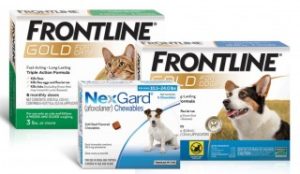
If your pet is constantly itchy and scratching, it’s time to bring your furry family member into the clinic. Pet skin issues can be acute (temporary) or chronic (persistent), and caused by a variety of factors, including environmental allergies, flea allergies, and food allergies. Instead of just treating symptoms, it’s important to get to the root of the problem to bring your dog or cat relief.
When your pet is losing hair or itchy, we need to first rule out sarcoptes mites, parasites that can cause severe itchiness, and some endocrine diseases that can cause hair loss (and resemble an itchy pet). Yeast infections and bacterial infections can also cause itchiness.
If your pet is itchy, we will take a skin scaling to look for mites, a skin cell sample to look for bacteria and yeast, and we may need to run some blood work to screen for endocrine diseases like hypothyroidism. Once we’ve ruled out anything health related, we can focus on environmental, food, and flea allergies.
 Flea Allergies
Flea Allergies
If your dog is itchy on the back half of the body, that’s usually a sign of flea allergies. Your cat may experience itching on the head and neck. If your pet is uncomfortably itchy or you notice fleas on your pet, be sure to give us a call. Your veterinarian can prescribe a short-term medication to make them more comfortable and begin a treatment program to address flea allergy dermatitis.
Apoquel® is a fast and effective treatment for both short and long-term allergic itch. The therapy can ease allergy symptoms in dogs within 4 hours, and controls itch within 24 hours. For dogs with multiple allergies or atopic dermatitis, Cytopoint® therapy provides 4 to 8 weeks of relief with a single in-clinic injection.
 Frontline® Gold and NexGard®, monthly preventatives available exclusively here at Sierra, get rid of fleas, effectively killing fleas, flea eggs, and larvae. Frontline® Gold is a fast-acting topical formula available for dogs and cats that’s easy to apply, and NexGard® chewables are beef-flavored soft chews for dogs and puppies that kill adult fleas before they have a chance to lay eggs. When dosed on time, 12 months a year, the medication protects your pet for a full 30 days and works to disrupt the flea life cycle.
Frontline® Gold and NexGard®, monthly preventatives available exclusively here at Sierra, get rid of fleas, effectively killing fleas, flea eggs, and larvae. Frontline® Gold is a fast-acting topical formula available for dogs and cats that’s easy to apply, and NexGard® chewables are beef-flavored soft chews for dogs and puppies that kill adult fleas before they have a chance to lay eggs. When dosed on time, 12 months a year, the medication protects your pet for a full 30 days and works to disrupt the flea life cycle.
Environmental Allergies
Environmental allergies can cause discomfort for your pet from and commonly start from about 6 months to 6 years old. House dust mites and pollen from grasses, trees, and weeds are the most common allergy triggers in our area.
Your veterinarian can determine what environmental allergens are bugging your dog by submitting a small blood sample for testing—your pet’s serum can be tested for sensitivity to common outdoor and indoor allergens.
Intradermal allergy testing, commonly called skin testing, can identify specific allergy triggers in dogs and cats. The process involves a brief sedation for your pet, and low doses of allergens are injected under the skin. Any redness or swelling at the site is evidence of positive reactions.
Once the skin testing is complete, injections can be formulated that you can give your pet at home. The allergy shots are an effective way to desensitize your pet by building tolerance over time (usually a few months), and immunotherapy is effective in about 70% of pets.
 Food Allergies
Food Allergies
Food allergies can occur throughout the year and cause itchiness all over the body. The most common dog allergens are beef cow’s milk, chicken, chicken eggs, and lamb. The most common cat allergens are fish, milk, milk products, beef, and lamb. Your pet may also have a corn or grain sensitivity, although protein allergies are more common.
We recommend feeding your pet a high quality diet rich in Omega 3 fatty acids, and avoid routinely changing the flavor or protein base of their diet. Frequent food changes can potentially expose your pet to many different proteins, unintentionally creating a food allergy.
If food allergies are a problem for your cat or dog, we recommend a diet trial with only one or two components, and a formula that contains new proteins such as rabbit, duck, kangaroo, or sweet potato. We also offer veterinary formulas here at the clinic. These balanced foods for cats or dogs are called hydrolyzed protein diets, with proteins that are broken down or hydrolyzed so that your pet’s immune system doesn’t react to them.
If your cat or dog is itchy, be sure to schedule an appointment. We can help you identify why your pet is itchy, and develop a custom plan to effectively treat the problem and prevent it from happening again.


